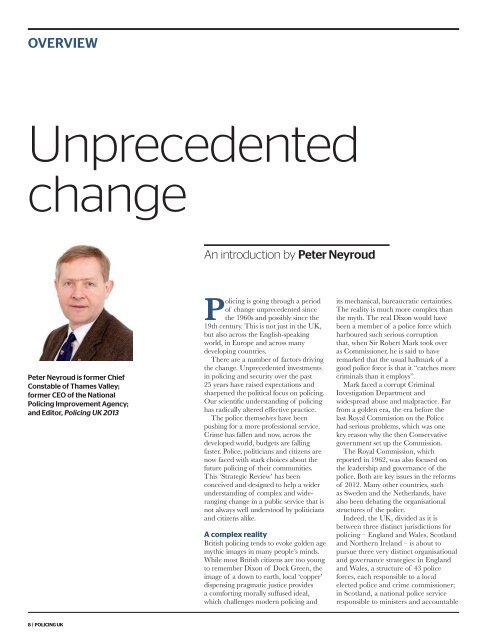Policing UK 2013 - Police Federation
Policing UK 2013 - Police Federation
Policing UK 2013 - Police Federation
You also want an ePaper? Increase the reach of your titles
YUMPU automatically turns print PDFs into web optimized ePapers that Google loves.
OVERVIEW<br />
Unprecedented<br />
change<br />
An introduction by Peter Neyroud<br />
Peter Neyroud is former Chief<br />
Constable of Thames Valley;<br />
former CEO of the National<br />
<strong>Policing</strong> Improvement Agency;<br />
and Editor, <strong>Policing</strong> <strong>UK</strong> <strong>2013</strong><br />
<strong>Policing</strong> is going through a period<br />
of change unprecedented since<br />
the 1960s and possibly since the<br />
19th century. This is not just in the <strong>UK</strong>,<br />
but also across the English-speaking<br />
world, in Europe and across many<br />
developing countries.<br />
There are a number of factors driving<br />
the change. Unprecedented investments<br />
in policing and security over the past<br />
25 years have raised expectations and<br />
sharpened the political focus on policing.<br />
Our scientific understanding of policing<br />
has radically altered effective practice.<br />
The police themselves have been<br />
pushing for a more professional service.<br />
Crime has fallen and now, across the<br />
developed world, budgets are falling<br />
faster. <strong>Police</strong>, politicians and citizens are<br />
now faced with stark choices about the<br />
future policing of their communities.<br />
This ‘Strategic Review’ has been<br />
conceived and designed to help a wider<br />
understanding of complex and wideranging<br />
change in a public service that is<br />
not always well understood by politicians<br />
and citizens alike.<br />
A complex reality<br />
British policing tends to evoke golden age<br />
mythic images in many people’s minds.<br />
While most British citizens are too young<br />
to remember Dixon of Dock Green, the<br />
image of a down to earth, local ‘copper’<br />
dispensing pragmatic justice provides<br />
a comforting morally suffused ideal,<br />
which challenges modern policing and<br />
its mechanical, bureaucratic certainties.<br />
The reality is much more complex than<br />
the myth. The real Dixon would have<br />
been a member of a police force which<br />
harboured such serious corruption<br />
that, when Sir Robert Mark took over<br />
as Commissioner, he is said to have<br />
remarked that the usual hallmark of a<br />
good police force is that it “catches more<br />
criminals than it employs”.<br />
Mark faced a corrupt Criminal<br />
Investigation Department and<br />
widespread abuse and malpractice. Far<br />
from a golden era, the era before the<br />
last Royal Commission on the <strong>Police</strong><br />
had serious problems, which was one<br />
key reason why the then Conservative<br />
government set up the Commission.<br />
The Royal Commission, which<br />
reported in 1962, was also focused on<br />
the leadership and governance of the<br />
police. Both are key issues in the reforms<br />
of 2012. Many other countries, such<br />
as Sweden and the Netherlands, have<br />
also been debating the organisational<br />
structures of the police.<br />
Indeed, the <strong>UK</strong>, divided as it is<br />
between three distinct jurisdictions for<br />
policing – England and Wales, Scotland<br />
and Northern Ireland – is about to<br />
pursue three very distinct organisational<br />
and governance strategies: in England<br />
and Wales, a structure of 43 police<br />
forces, each responsible to a local<br />
elected police and crime commissioner;<br />
in Scotland, a national police service<br />
responsible to ministers and accountable<br />
8 | POLICING <strong>UK</strong>
















